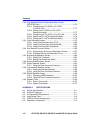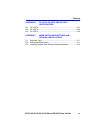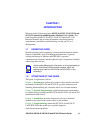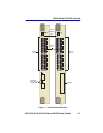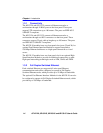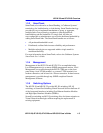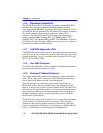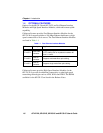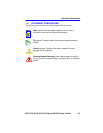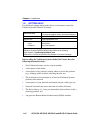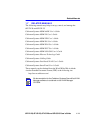
Chapter 1:
Introduction
1-6 6E122-26, 6E132-25, 6E123-26 and 6E133-25 User’s Guide
1.3.6 Standards Compatibility
The 6E12X-26 and 6E13X-25 are fully compliant with the IEEE 802.3
standard. The optional Fast Ethernet Interface Modules are fully
compliant with the IEEE 802.3u standard. The 6E12X-26 and 6E13X-25
provide IEEE 802.1D Spanning Tree Algorithm (STA) support to enhance
the overall reliability of the network and protect against “loop”
conditions. The 6E12X-26 and 6E13X-25 support a wide variety of
industry standard MIBs including RFC 1213 (MIB II), RFC 1757
(RMON), RFC 1493 (Bridge MIB) and RFC 1354 (FIB MIB). A full suite
of Cabletron Systems Enterprise MIBs provide a wide array of statistical
information to enhance troubleshooting.
1.3.7 LANVIEW Diagnostic LEDs
LANVIEW diagnostic LEDs serve as an important troubleshooting aid by
providing an easy way to observe the status of individual ports and overall
network operations. Chapter 4 provides details about the 6E12X-26 and
6E13X-25 LANVIEW LEDs.
1.3.8 Year 2000 Compliant
The 6E12X-26 and 6E13X-25 have an internal clock that can maintain the
current time and date beyond the year 1999.
1.3.9 Runtime IP Address Discovery
This feature enables the modules to automatically accept an IP address
from a BootP server on the network into NVRAM without requiring a
user to enter an IP address through Local Management.
When the modules are connected to the network and powered up,
Runtime IP Address Discovery (RAD) checks the modules for an IP
address. If one has not yet been assigned (module and 6C105 chassis IP
address set to 0.0.0.0), RAD checks to see if any of the module interfaces
have a link. If so, RAD sends out Reverse Address Resolution Protocol
(RARP) and BootP requests to obtain an IP address from a RARP or
BootP server on the network.
The RAD requests start out at an interval of one second. The interval then
doubles after every transmission until an interval of 300 seconds is
reached. At this point, the interval remains at 300 seconds. The RAD
requests continue until an IP address is received from a RARP or BootP
server, or an IP address is entered using Local Management.



